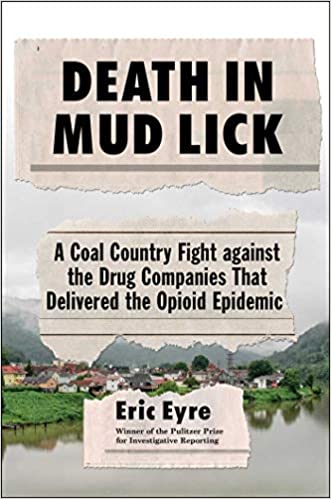The Provincetown INDEPENDENT
April 2020
Book Review:
Unearthing the Corporate Misdeeds behind Death in Mud Lick
Eric Eyre’s intrepid reporting on the opioid epidemic has a timely message
![]() See the original on-line article
See the original on-line article
Pulitzer Prize-winning reporter Eric Eyre braids together two riveting stories in Death in Mud Lick: A Coal Country Fight Against the Drug Companies That Delivered the Opioid Epidemic. Numbers are central to both of the stories. Each is essential reading for all who live on or love the Outer Cape.

The first story Eyre tells is how he was able to report the numbers of prescription painkillers that drug distributors had funneled into southern West Virginia. Distributors considered these numbers to be proprietary information and kept them secret until Eyre, his newspaper (the Charleston Gazette-Mail), and a legal team successfully brought suit.
Eyre is a master at rendering character and creating drama as he details the process involved in the numbers’ eventual release. He peoples Death in Mud Lick with an ex-con grieving the loss of her upstanding brother felled by addiction, a cigar-chewing lawyer with a heart of gold, a panoply of double-talking middle managers, and a host of elected officials who wouldn’t know responsible action if it smacked them in the face. He deploys all to help him explain why it was so difficult to prove that extraordinary numbers of prescriptions for hydrocodone and its stronger cousin, oxycodone, led to an escalation in local overdoses.
He had anecdotal evidence that unethical physicians were writing record numbers of these prescriptions for synthetic opiates. He could see that pharmacies in tiny towns were dispensing more of the highly addictive pills in a month than most drug stores in major metropolitan areas did in a year. But he could not wrest hard data from anyone in possession of what, he argued, should have been public knowledge: not from the Drug Enforcement Administration, the state pharmacy board, or the drug distributors that were amassing fortunes from sales.
Eyre makes readers care about what, in less able hands, could be dry, meandering legal twists and turns. The Pulitzer committee singled out his reporting for a prize because Eyre spins gold from straw — for instance, the way he chronicles a circuit judge’s decision to release specific information about sales of prescription medications. Once Eyre had the numbers in question, he could show that one distributor alone had supplied “119 million doses of highly addictive drugs to West Virginia pharmacies between 2007 and 2012, or roughly 80 pills for every man, woman, and child in the state. About 90 million of those pills were prescription opioids.” Such numbers, Eyre concludes, explain exactly how impoverished coal country towns became an epicenter of addiction and fatal overdoses.
Death in Mud Lick should serve as a handbook for Reporting 101. Eyre shows how a refusal to take no for an answer eventually pays off. It would take years of lawsuits, depositions, phone calls, data searches, and Freedom of Information Act requests — as well as some plain old lucky breaks — before Eyre had collected hard evidence against the wholesalers whose disregard for statutes and standards made the opioid crisis possible.
This dogged sleuthing leads to Eyre’s second story line, which focuses on circulation numbers and the financial and legal battle to sustain an independently owned, family-run local newspaper. How can the owners of the Charleston Gazette-Mail raise enough money to fend off corporate takeovers and support declining numbers of staff? How can they avoid imposing layoffs that would jeopardize Eyre’s own livelihood? If the paper folds, who will be left to crank out daily stories and investigate those charged with protecting the public, such as a lying district attorney whose lobbyist wife earned millions from a drug distribution company the state was suing?
Writing in the tradition of All the President’s Men and other tales of journalistic derring-do, Eyre tells the story of his scrappy paper’s refusal to fold or give up editorial control at a time when media conglomerates are gutting one of the few means left to provide taxpayers with access to critical information.
Eyre helps readers appreciate moments when newspaper owners and reporters alike crow over even small victories. He devotes a chapter to “Sustained Outrage,” the paper’s unofficial motto and a universal credo of investigative reporters around the world. When opposing counsel in a lawsuit describes the Charleston Gazette-Mail as having an “intrusive journalistic nose,” he unwittingly pays Eyre’s paper the highest compliment. Eyre ties the newspaper’s survival to the right of West Virginians to demand and win damages to pay for the spiraling costs related to the opioid epidemic — for addiction treatment, health care, foster care, criminal investigations, prosecutions, prison administration, body transports, and autopsies.
While some readers may find a story about the opioid epidemic very 2019, they should appreciate Eyre’s twin narratives as nonetheless timely. Like opioids, Covid-19 will be with us far longer than anyone wishes, and it will claim far more lives than it should. And whenever we need access to hard truths and hard-to-get evidence, our best hope will be journalists like Eyre and courageous independent newspapers.